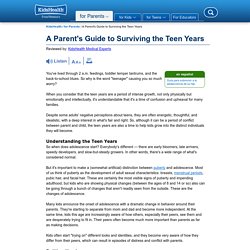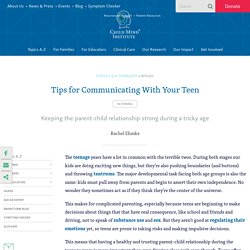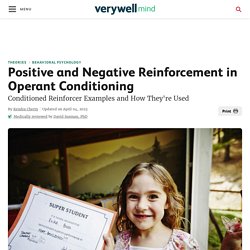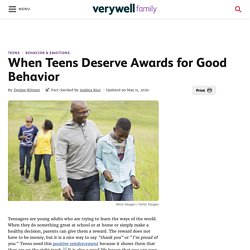

20 must know facts about teens - Parenting Ideas. Every two years Dolly, Australia’s most popular magazine for teenage girls, takes a look at the constants in the lives of teenagers – such as school, sex, relationships, alcohol, family and body image – and tracks their thoughts, behaviours and the trends that shape them.

Using a mixture of surveys and focus groups the Dolly Youth Monitor has been tracking teenage trends for over two decades. As director of Parenting Ideas, I’ve been fortunate enough to be involved in the interpretation and presentation of the data to various groups for two Dolly Youth Monitor surveys. Based on the up-to-date insights provided by the survey, here are twenty things you should know as an educator or parent involved with teenagers today. 1. Today’s teens grow up in small families with 45% having one or no other siblings. 2. The Adolescent Brain: A second window of opportunity. What Teens Need Most From Their Parents. The teenage years can be mystifying for parents.

Sensible children turn scatter-brained or start having wild mood swings. Formerly level-headed adolescents ride in cars with dangerous drivers or take other foolish risks. A flood of new research offers explanations for some of these mysteries. Brain imaging adds another kind of data that can help test hypotheses and corroborate teens’ own accounts of their behavior and emotions. Dozens of recent multiyear studies have traced adolescent development through time, rather than comparing sets of adolescents at a single point. The new longitudinal research is changing scientists’ views on the role parents play in helping children navigate a volatile decade. Ages 11 to 12 As puberty takes center stage, tweens can actually slip backward in some basic skills. Secret to Communicating with Teenagers. As a therapist and the mother of three teenagers myself, I know firsthand that the more you push your kids, the more they get defensive and dig in their heels.

They become reactive in the form of explosiveness or shutting down and ignoring you. When they are not exploding, they are thinking the following: “My parents don’t have a clue, so what’s the point of trying to explain myself? I’ll just tune them out.” Clamming up or exploding are both ways your teenagers attempt to manage their stress and defend themselves. In fact, these may be the only ways your teen knows how to communicate when things get intense—which of course only causes more conflict. Here are 5 secrets that I’ve found to be really helpful for communicating with kids through the difficult adolescent years. 4 Things You Should Never Say to Your Teen. Every parent gets mad and says things in the heat of the moment that they regret—nobody’s perfect, and there is no such thing as a perfect parent.

At one time or another, most parents also report feeling like their teen is not listening to them. You wonder why what you’re saying doesn’t seem to have any effect—it goes “in one ear and out the other,” and meanwhile, your child’s behavior doesn’t improve. “Focus on the behavior, not the person.” When your child repeatedly ignores you, defies you or fights with you over everything, you might even wonder if you’re doing things right, and if somehow you’re failing at parenting. But as James Lehman said, “I don’t like to think about parenting in terms of ‘good’ or ‘bad.’ A Parent's Guide to Surviving the Teen Years. You've lived through 2 a.m. feedings, toddler temper tantrums, and the back-to-school blues.

So why is the word "teenager" causing you so much worry? When you consider that the teen years are a period of intense growth, not only physically but emotionally and intellectually, it's understandable that it's a time of confusion and upheaval for many families. Despite some adults' negative perceptions about teens, they are often energetic, thoughtful, and idealistic, with a deep interest in what's fair and right. So, although it can be a period of conflict between parent and child, the teen years are also a time to help kids grow into the distinct individuals they will become.
Understanding the Teen Years. Parents, family relationships & teenagers. Teenagers, parents and family relationships Many people think that families become less important to children as they move into the teenage years.

But your child needs your family and the support it offers as much as she did when she was younger. It’s true that family relationships change during adolescence. When your child was young, your role was to nurture and guide him. Tips for Communicating With Your Teen. The teenage years have a lot in common with the terrible twos.

During both stages our kids are doing exciting new things, but they’re also pushing boundaries (and buttons) and throwing tantrums. The major developmental task facing both age groups is also the same: kids must pull away from parents and begin to assert their own independence. No wonder they sometimes act as if they think they’re the center of the universe. This makes for complicated parenting, especially because teens are beginning to make decisions about things that that have real consequence, like school and friends and driving, not to speak of substance use and sex. But they aren’t good at regulating their emotions yet, so teens are prone to taking risks and making impulsive decisions. This means that having a healthy and trusting parent-child relationship during the teenage years is more important than ever. What Is Reinforcement? Psychology, Definition, And Applications. By: Toni Hoy Updated February 11, 2021 Medically Reviewed By: Whitney White, MS.

CMHC, NCC., LPC Reinforcement psychology is the study of the effect of reinforcement techniques on behavior. What Is Reinforcement in Operant Conditioning? One of the many different ways in which people can learn is through a process known as operant conditioning (also known as instrumental conditioning).1 This involves learning through reinforcement or punishment.

The type of reinforcement used can play an important role in how quickly a behavior is learned and the overall strength of the resulting response. Understanding Reinforcement Reinforcement is a term used in operant conditioning to refer to anything that increases the likelihood that a response will occur. Psychologist B.F. Skinner is considered the father of this theory. For example, reinforcement might involve presenting praise (the reinforcer) immediately after a child puts away her toys (the response). Reinforcement can include anything that strengthens or increases a behavior, including specific tangible rewards, events, and situations. Why Positive Reinforcement Works. How to Reward Your Teen for Good Behavior. Teenagers are young adults who are trying to learn the ways of the world.

When they do something great at school or at home or simply make a healthy decision, parents can give them a reward. The reward does not have to be money, but it is a nice way to say "thank you" or "I'm proud of you. " Teens need this positive reinforcement because it shows them that they are on the right track.1 It is also a good life lesson that you can pass on: good things happen to good people. Parenting A Teen Through Positive Reinforcement - Back On Track. Most parents can agree: the teenage years can be rough! Hormones are raging, they are trying to gain more independence, and they spend a lot of time away from their parents and their home while hanging with friends. One minute they love and adore you, the next minute you ruined their life. Teens May Learn Best with Positive Reinforcement. A new study finds that adolescents focus on rewards and are less able to learn to avoid punishment or consider the consequences of alternative actions.
University College-London investigators compared how adolescents and adults learn to make choices based on the available information. Investigators tracked the way in which 18 volunteers aged 12-17 and 20 volunteers aged 18-32 completed tasks in which they had to choose between abstract symbols. Each symbol was consistently associated with a fixed chance of a reward, punishment, or no outcome. As the trial progressed, participants learned which symbols were likely to lead to each outcome and adjusted their choices accordingly. Adolescents and adults were equally good at learning to choose symbols associated with reward, but adolescents were less good at avoiding symbols associated with punishment. The study appears in PLOS Computational Biology. “From this experimental lab study we can draw conclusions about learning during adolescence. Examples of Positive Reinforcement. Negative Reinforcement: What Is It and How Does It Work?
What is negative reinforcement? Negative reinforcement is a method that can be used to help teach specific behaviors. With negative reinforcement, something uncomfortable or otherwise unpleasant is taken away in response to a stimulus. Over time, the target behavior should increase with the expectation that the unpleasant thing will be taken away. Read on to learn more about this type of learning. The relationship between behavior and consequences is part of a type of learning called operant conditioning. For negative reinforcement to work, whatever is taken away must be taken away immediately after the behavior in question.
Examples. Negative reinforcement: Definition and examples. Negative reinforcement encourages specific behaviors by removing or avoiding negative consequences or stimuli. It is different than punishment, which aims to discourage a specific behavior. Negative Reinforcement and Operant Conditioning. Negative reinforcement is a term described by B. F. Skinner in his theory of operant conditioning. Examples of Negative Reinforcement. The Study of Punishment in Psychology. What Is Punishment Psychology, And Should You Use It? Positive Punishment: What It Is, Benefits, and Examples. Positive Punishment and Operant Conditioning. Positive Punishment in Operant Conditioning [Definition & Examples]
Positive punishment is often used in life when we want to suppress unwanted behavior. Let’s examine its definition, usage and examples, especially when it comes to parenting. Examples of Positive Punishment. How Negative Punishment Works. Negative punishment is an important concept in B. F. Skinner's theory of operant conditioning.
In behavioral psychology, the goal of punishment is to decrease unwanted behavior. In the case of negative punishment, it involves taking something good or desirable away to reduce the occurrence of a particular behavior. What is Negative Punishment (Examples and Effectiveness) In this article, we will review negative punishment, its definition, examples, and drawbacks.
Negative Punishment Examples and Scenarios. Nobody ever wants their stuff taken away. Examples of Negative Punishment. 12 Examples of Positive Punishment & Negative Reinforcement. You might be thinking that “positive punishment” sounds like an oxymoron, after all, how can punishment be positive? Not many people “like” punishment, right? The disconnect in understanding this concept comes from the usage of the word “positive;” here at PositivePsychology.com, we generally use the term “positive” to refer to things that are inherently good, things that are life-giving, and things that promote thriving and flourishing.
The concept of positive punishment comes from a very different era and a very different perspective on psychology; namely, the 1930s and behaviorism. So, what actually is positive punishment and how does it relate to parenting, teaching, and even the workplace? Before you read on, we thought you might like to download our 3 Positive Psychology Exercises for free. You can download the free PDF here. Reinforcement vs. Punishment: Changing Behavior. Being a parent has been known as the best thing ever BUT also the most challenging endeavor you will encounter in your lifetime.
Positive vs. Negative Reinforcement: A Guide for Parents – Generation Mindful. Punishment Vs Reinforcement: Getting the Behavior You Want From Your Kids. Learning: Negative Reinforcement vs. Punishment.